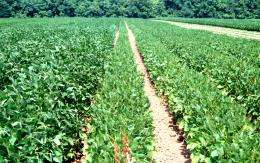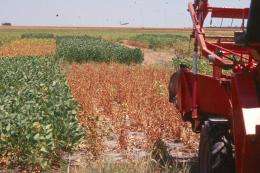Soybean trials help producers find earlier maturing varieties

Soybeans aren’t something new for Texas producers, but one Texas AgriLife Extension Service expert is trying to help develop a production system that will help combat the drought and includes varieties that mature earlier.
Texas has always been the westernmost and southernmost state growing soybeans, with about 200,000-250,000 acres planted annually. Recently, though, drought conditions have caused a drop in acreage, according to Dr. Travis Miller, associate department head and AgriLife Extension program leader in the Texas A&M University soil and crop sciences department.
Soybeans are a riskier crop than sorghum or wheat, he said. But having more than $14-per-bushel prices right now means there’s good money “if you can make a crop.”
Miller is participating in the Mid-South Soybean Consortium trials being planted in Texas, Oklahoma, Louisiana and Arkansas under the direction of Dr. Larry Purcell with the University of Arkansas.
Soybeans can be a determinant or indeterminate crop, he said. Indeterminate means the crop can put on blooms and continue to grow at the same time. Determinant, or late-maturing soybeans, must reach a certain photoperiod, or day length, before they bloom.

“We are looking for varieties that can be early planted and which the bloom date coincides with more favorable growing conditions,” Miller said.
College Station is the southernmost trial, he said. This trial will include eight varieties mixed between determinant and indeterminate varieties, with each planted on four different dates. The earliest planted was on March 26 and the latest will be planted early in June.
“We’re looking at the number of nodes per plant, plant height, bloom date – all factors that are affected by photoperiod and growing conditions,” Miller said.
He said they would like to find plants that are less photoperiod sensitive to plant in regions with available sunshine and moisture.
Determinant soybeans generally grow from May to September, or about 160 days, while the indeterminate varieties can be planted as early as March and harvested in late July or early August, or less than 140 days, Miller said.
The indeterminate plants will grow and set pods at the same time, allowing more height and more nodes, “and that’s what pays,” he said.
“It also fits our weather patterns better,” Miller said. “We know we get rain in April and May and that’s the ideal time to set pods, so we would be able to use the weather patterns if we find good indeterminate varieties for this region.”
The overall goal is to minimize the risk and better utilize the weather and resources that we have, he said.
Texas soybeans are primarily grown in the upper Gulf Coast, south of Houston and around Beaumont, northeast Texas along the Red River and a smattering of irrigated acres on the High Plains, Miller said.
Provided by Texas A&M AgriLife


















